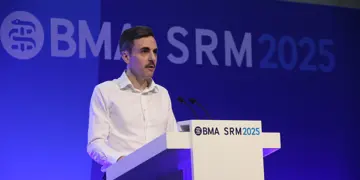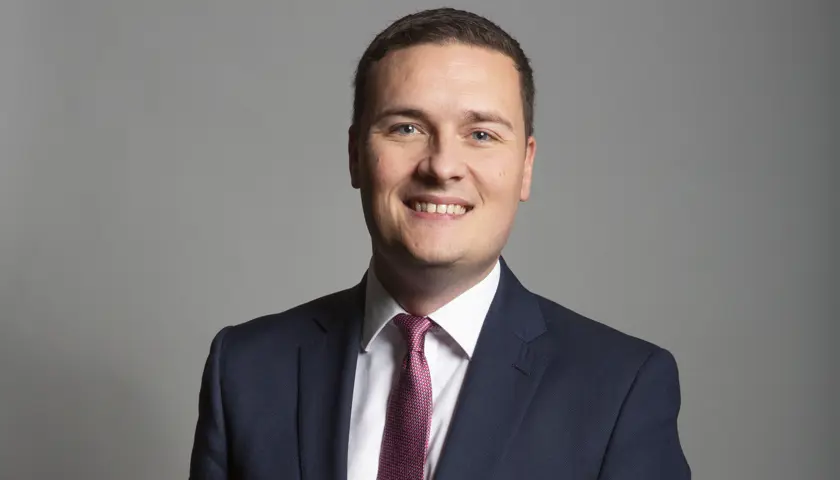10-year plan lacks substance
10-year plan lacks substance
Doctors mull the Government’s long-term strategy for the NHS at emergency meeting and find a dearth of detail as well as concerns with finance initiatives. Tim Tonkin reports
‘No one should underestimate this crisis. As doctors we see it unfolding everyday of our working lives.’
BMA council chair Tom Dolphin (pictured above) was in no mood to mince his words in his speech to today’s special representative meeting in London.
As the first special meeting to be held in more than a decade, the SRM was convened in response to the medical profession’s concerns and uncertainties with the details of the Government’s 10 Year Plan for the NHS.
Published on 3 July this year, ‘Fit for the future: 10 Year Health Plan for England’ seeks to implement wide-ranging transformation of the NHS in England, with the plan’s vision centred around three principles.
These include moving to a preventive model of healthcare, increasing digitisation of the NHS and restructuring services to shift the burden of care from hospitals and into community settings.
Lack of detail
However, these ambitions have prompted concern from the BMA which has pointed to a lack of substance or detail to some of the proposals, a lack of clarity with how they will be funded and incredulity with the plan’s admission that total NHS staffing will be reduced in the coming decade.
In his opening address to the SRM, Dr Dolphin emphasised that the parlous and precarious state of the health service meant enacting a long-term plan for its future was ‘not just appealing but is essential’.
In acknowledging the extent of this crisis, however, he warned change and reform had to have the confidence and consent of the health service workforce, warning the unrelenting pressures of recent years had left the ‘social contract between doctors and society broken’.
He said: ‘The whole nation knows that the health service is in deep crisis. The family doctor is harder than ever to see. Waits for hospital appointments are too often measured in years, not days and weeks. Public health has been broken by restructure and neglect [and] despite understaffing across the NHS, we are facing the absurd spectacle of doctors out of work.
‘As doctors, and as the British Medical Association, it is our responsibility today to consider and to scrutinise the proposals contained within the UK Government’s 10 Year Plan for the NHS.
‘This moment no doubt needs a plan of action. It requires sustained and unyielding effort – with sufficient staff and funding and building on what already works.
‘But this effort cannot simply be put on healthcare workers as too often it is. We can’t just optimise our way out of this crisis or become more productive at slowly collapsing.
‘We can no longer accept that it is doctors and nurses who must toil relentlessly to keep this country’s health service from tipping over that edge. We need the Government to step up and fulfil their promise.’
Training places
Since its publication, the BMA has poured over the contents of the 10 Year Plan identifying areas of consensus and encouragement but also scepticism and concern.
Indeed, a BMA survey of almost 3,000 grassroots doctors conducted between 10 and 20 of August found that 83 per cent of respondents were keen for the BMA to engage with the plan but to also lobby for change and improvement to certain aspects of it.
These include the plan’s pledge to expand the number of specialty training places by an extra 1,000, an increase the BMA has flatly warned will not adequately address existing issues with recruitment or workforce sustainability.
The plan also outlines a commitment to train thousands of new GPs as part of a broader shift of NHS recruitment into primary care.
It also aims to create one-stop-shop neighbourhood health services and integrated health organisations, ambitions which many GPs fear pose an existential threat to the independent contractor model and the general medical services contract.
Listening plea
With today’s SRM dedicated to confronting and addressing these concerns, Dr Dolphin warned that only by listening to the voices of doctors could the Government ensure the aims of the plan were shared ones that could be made reality.
Dr Dolphin said: ‘Today, as the voice of the medical profession, we will decide whether this plan does, in the words of the secretary of state, have our fingerprints over it. Whether it speaks – genuinely – to this moment of crisis. Whether – even if we agree with its ambition – its remedy is correct, or not.
‘It is no longer enough to publish a plan; the Government knows it must do the hard work of making these shared goals happen. It must understand the reality on the ground. It must listen to the voices here today.’
He added: ‘If we don’t get this right, in 10 years’ time, we won’t be discussing another plan, we will be lamenting the demise of what was another Labour health secretary’s industrious creation. And if that happens, the old shadows will quickly descend – illness, disease and suffering.’
Following Dr Dolphin’s address, health secretary Wes Streeting, who joined the conference via video-link, insisted that he was determined to use his role to rebuild a relationship between government and medical profession that had been left broken by his predecessors.
Acknowledging this, Mr Streeting advised that the Government was cautiously exploring private financing options to support the plan but that ministers were ‘treading extremely carefully in this area’.
He said: ‘No one wants us to repeat the costly mistakes of the private finance initiative, but we have seen in other areas of you know, the mutual investment model that the Welsh Labor Government has used … so I’m interested in that kind of approach that's been proven to work.’
With the 10-year plan backing moves to prioritise UK medical graduates for access to foundation and specialty training posts, Dr Dolphin asked whether this commitment would be implemented in time for the 2025-26 recruitment cycle.
While declining to give a guarantee, Mr Streeting said that he was working ‘as fast as I can to make it happen’ adding that it was ‘the right thing to do’.




